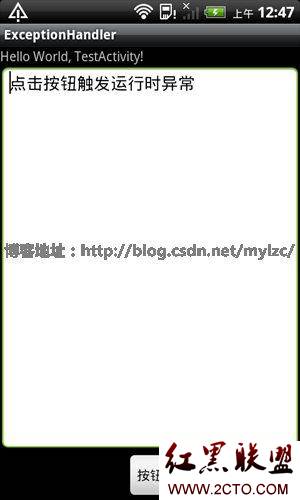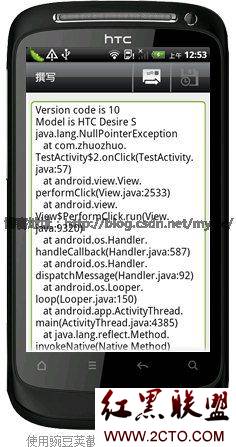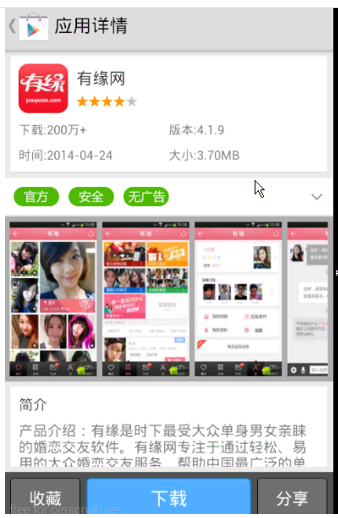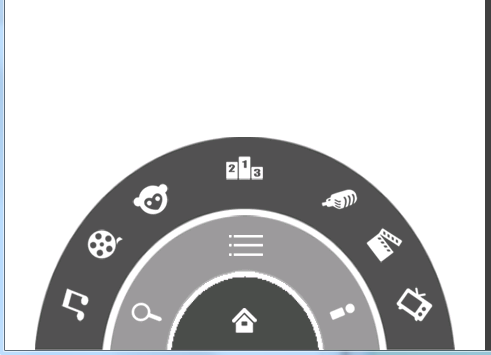編輯:關於android開發
轉載博客:http://blog.csdn.net/i_lovefish/article/details/17719081
以下為異常捕捉處理代碼:
import java.io.BufferedReader;
import java.io.File;
import java.io.FileInputStream;
import java.io.FileNotFoundException;
import java.io.FileOutputStream;
import java.io.IOException;
import java.io.InputStreamReader;
import java.io.PrintWriter;
import java.io.StringWriter;
import java.io.Writer;
import java.lang.Thread.UncaughtExceptionHandler;
import java.lang.reflect.Field;
import java.text.DateFormat;
import java.text.SimpleDateFormat;
import java.util.Date;
import java.util.HashMap;
import java.util.Map;
import android.content.Context;
import android.content.pm.PackageInfo;
import android.content.pm.PackageManager;
import android.content.pm.PackageManager.NameNotFoundException;
import android.os.Build;
import android.os.Environment;
import android.os.Looper;
import android.util.Log;
import android.widget.Toast;
/**
* UncaughtException處理類,當程序發生Uncaught異常的時候,有該類來接管程序,並記錄發送錯誤報告.
*
* 需要在Application中注冊,為了要在程序啟動器就監控整個程序。
*/
public class CrashHandler implements UncaughtExceptionHandler {
public static final String TAG = "CrashHandler";
//系統默認的UncaughtException處理類
private Thread.UncaughtExceptionHandler mDefaultHandler;
//CrashHandler實例
private static CrashHandler instance;
//程序的Context對象
private Context mContext;
//用來存儲設備信息和異常信息
private Map<String, String> infos = new HashMap<String, String>();
//用於格式化日期,作為日志文件名的一部分
private DateFormat formatter = new SimpleDateFormat("yyyy-MM-dd-HH-mm-ss");
/** 保證只有一個CrashHandler實例 */
private CrashHandler() {}
/** 獲取CrashHandler實例 ,單例模式 */
public static CrashHandler getInstance() {
if(instance == null)
instance = new CrashHandler();
return instance;
}
/**
* 初始化
*/
public void init(Context context) {
mContext = context;
//獲取系統默認的UncaughtException處理器
mDefaultHandler = Thread.getDefaultUncaughtExceptionHandler();
//設置該CrashHandler為程序的默認處理器
Thread.setDefaultUncaughtExceptionHandler(this);
}
/**
* 當UncaughtException發生時會轉入該函數來處理
*/
@Override
public void uncaughtException(Thread thread, Throwable ex) {
if (!handleException(ex) && mDefaultHandler != null) {
//如果用戶沒有處理則讓系統默認的異常處理器來處理
mDefaultHandler.uncaughtException(thread, ex);
} else {
try {
Thread.sleep(3000);
} catch (InterruptedException e) {
Log.e(TAG, "error : ", e);
}
//退出程序
android.os.Process.killProcess(android.os.Process.myPid());
System.exit(1);
}
}
/**
* 自定義錯誤處理,收集錯誤信息 發送錯誤報告等操作均在此完成.
*
* @param ex
* @return true:如果處理了該異常信息;否則返回false.
*/
private boolean handleException(Throwable ex) {
if (ex == null) {
return false;
}
//收集設備參數信息
collectDeviceInfo(mContext);
//使用Toast來顯示異常信息
new Thread() {
@Override
public void run() {
Looper.prepare();
Toast.makeText(mContext, "很抱歉,程序出現異常,即將退出.", Toast.LENGTH_SHORT).show();
Looper.loop();
}
}.start();
//保存日志文件
saveCatchInfo2File(ex);
return true;
}
/**
* 收集設備參數信息
* @param ctx
*/
public void collectDeviceInfo(Context ctx) {
try {
PackageManager pm = ctx.getPackageManager();
PackageInfo pi = pm.getPackageInfo(ctx.getPackageName(), PackageManager.GET_ACTIVITIES);
if (pi != null) {
String versionName = pi.versionName == null ? "null" : pi.versionName;
String versionCode = pi.versionCode + "";
infos.put("versionName", versionName);
infos.put("versionCode", versionCode);
}
} catch (NameNotFoundException e) {
Log.e(TAG, "an error occured when collect package info", e);
}
Field[] fields = Build.class.getDeclaredFields();
for (Field field : fields) {
try {
field.setAccessible(true);
infos.put(field.getName(), field.get(null).toString());
Log.d(TAG, field.getName() + " : " + field.get(null));
} catch (Exception e) {
Log.e(TAG, "an error occured when collect crash info", e);
}
}
}
/**
* 保存錯誤信息到文件中
*
* @param ex
* @return 返回文件名稱,便於將文件傳送到服務器
*/
private String saveCatchInfo2File(Throwable ex) {
StringBuffer sb = new StringBuffer();
for (Map.Entry<String, String> entry : infos.entrySet()) {
String key = entry.getKey();
String value = entry.getValue();
sb.append(key + "=" + value + "\n");
}
Writer writer = new StringWriter();
PrintWriter printWriter = new PrintWriter(writer);
ex.printStackTrace(printWriter);
Throwable cause = ex.getCause();
while (cause != null) {
cause.printStackTrace(printWriter);
cause = cause.getCause();
}
printWriter.close();
String result = writer.toString();
sb.append(result);
try {
long timestamp = System.currentTimeMillis();
String time = formatter.format(new Date());
String fileName = "crash-" + time + "-" + timestamp + ".log";
if (Environment.getExternalStorageState().equals(Environment.MEDIA_MOUNTED)) {
String path = "/mnt/sdcard/crash/";
File dir = new File(path);
if (!dir.exists()) {
dir.mkdirs();
}
FileOutputStream fos = new FileOutputStream(path + fileName);
fos.write(sb.toString().getBytes());
//發送給開發人員
sendCrashLog2PM(path+fileName);
fos.close();
}
return fileName;
} catch (Exception e) {
Log.e(TAG, "an error occured while writing file...", e);
}
return null;
}
/**
* 將捕獲的導致崩潰的錯誤信息發送給開發人員
*
* 目前只將log日志保存在sdcard 和輸出到LogCat中,並未發送給後台。
*/
private void sendCrashLog2PM(String fileName){
if(!new File(fileName).exists()){
Toast.makeText(mContext, "日志文件不存在!", Toast.LENGTH_SHORT).show();
return;
}
FileInputStream fis = null;
BufferedReader reader = null;
String s = null;
try {
fis = new FileInputStream(fileName);
reader = new BufferedReader(new InputStreamReader(fis, "GBK"));
while(true){
s = reader.readLine();
if(s == null) break;
//由於目前尚未確定以何種方式發送,所以先打出log日志。
Log.i("info", s.toString());
}
} catch (FileNotFoundException e) {
e.printStackTrace();
} catch (IOException e) {
e.printStackTrace();
}finally{ // 關閉流
try {
reader.close();
fis.close();
} catch (IOException e) {
e.printStackTrace();
}
}
}
}
針對異常的捕捉要進行全局監控整個項目,所以要將其在Application中注冊(也就是初始化):
import android.app.Application;
public class CrashApplication extends Application {
@Override
public void onCreate() {
super.onCreate();
CrashHandler catchHandler = CrashHandler.getInstance();
catchHandler.init(getApplicationContext());
}
}
現在模擬一個空指針異常:
import android.app.Activity;
import android.os.Bundle;
public class CatchExceptionLogActivity extends Activity {
/** Called when the activity is first created. */
private String s;
@Override
public void onCreate(Bundle savedInstanceState) {
super.onCreate(savedInstanceState);
setContentView(R.layout.main);
System.out.println(s.equals("hello")); // s沒有進行賦值,所以會出現NullPointException異常
}
}
別忘了在配置文件中對Application進行注冊:
<?xml version="1.0" encoding="utf-8"?>
<manifest xmlns:android="http://schemas.android.com/apk/res/android"
package="com.forms.catchlog"
android:versionCode="1"
android:versionName="1.0" >
<uses-sdk android:minSdkVersion="8" />
<uses-permission android:name="android.permission.WRITE_EXTERNAL_STORAGE"/>
<application
android:icon="@drawable/ic_launcher"
android:label="@string/app_name"
<span>activity
android:label="@string/app_name"
android:name=".CatchExceptionLogActivity" >
<intent-filter >
<action android:name="android.intent.action.MAIN" />
<category android:name="android.intent.category.LAUNCHER" />
</intent-filter>
</activity>
</application>
</manifest>
添加異常捕獲之後的日志提示
由於Android設備各異,第三方定制的Android系統也非常多,我們不可能對所有的設備場景都進行測試,因而開發一款完全無bug的應用幾乎是不可能的任務,那麼當應用在用戶的設備上Force Close時,我們是不是可以捕獲這個錯誤,記錄用戶的設備信息,然後讓用戶選擇是否反饋這些堆棧信息,通過這種bug反饋方式,我們可以有針對性地對bug進行修復。
當我們的的應用由於運行時異常導致Force Close的時候,可以設置主線程的UncaughtExceptionHandler,實現捕獲運行時異常的堆棧信息。同時用戶可以把堆棧信息通過發送郵件的方式反饋給我們。下面是實現的代碼:
代碼下載請按此
例子:點擊按鈕後,會觸發一個NullPointerException的運行時異常,這個例子實現了捕獲運行時異常,發送郵件反饋設備和堆棧信息的功能。
界面1(觸發運行時異常)

界面2(發送堆棧信息)

TestActivity.java
package com.zhuozhuo;
import java.io.PrintWriter;
import java.io.StringWriter;
import java.lang.Thread.UncaughtExceptionHandler;
import android.app.Activity;
import android.content.Intent;
import android.net.Uri;
import android.os.Build;
import android.os.Bundle;
import android.util.Log;
import android.view.View;
import android.view.View.OnClickListener;
import android.widget.EditText;
import android.widget.TextView;
public class TestActivity extends Activity {
/** Called when the activity is first created. */
@Override
public void onCreate(Bundle savedInstanceState) {
super.onCreate(savedInstanceState);
setContentView(R.layout.main);
Thread.setDefaultUncaughtExceptionHandler(new UncaughtExceptionHandler() {//給主線程設置一個處理運行時異常的handler
@Override
public void uncaughtException(Thread thread, final Throwable ex) {
StringWriter sw = new StringWriter();
PrintWriter pw = new PrintWriter(sw);
ex.printStackTrace(pw);
StringBuilder sb = new StringBuilder();
sb.append("Version code is ");
sb.append(Build.VERSION.SDK_INT + "\n");//設備的Android版本號
sb.append("Model is ");
sb.append(Build.MODEL+"\n");//設備型號
sb.append(sw.toString());
Intent sendIntent = new Intent(Intent.ACTION_SENDTO);
sendIntent.setData(Uri.parse("mailto:[email protected]"));//發送郵件異常到[email protected]郵箱
sendIntent.putExtra(Intent.EXTRA_SUBJECT, "bug report");//郵件主題
sendIntent.putExtra(Intent.EXTRA_TEXT, sb.toString());//堆棧信息
startActivity(sendIntent);
finish();
}
});
findViewById(R.id.button).setOnClickListener(new OnClickListener() {
@Override
public void onClick(View v) {
Integer a = null;
a.toString();//觸發nullpointer運行時錯誤
}
});
}
}
main.xml
<?xml version="1.0" encoding="utf-8"?>
<LinearLayout xmlns:android="http://schemas.android.com/apk/res/android"
android:orientation="vertical" android:layout_width="fill_parent"
android:layout_height="fill_parent">
<TextView android:layout_width="fill_parent"
android:layout_height="wrap_content" android:text="@string/hello" />
<EditText android:id="@+id/editText1" android:layout_width="match_parent"
android:text="點擊按鈕觸發運行時異常" android:layout_height="wrap_content"
android:layout_weight="1" android:gravity="top"></EditText>
<Button android:text="按鈕" android:id="@+id/button"
android:layout_width="wrap_content" android:layout_height="wrap_content"
android:layout_gravity="center_horizontal"></Button>
</LinearLayout>
 Android下創建一個SQLite數據庫,androidsqlite
Android下創建一個SQLite數據庫,androidsqlite
Android下創建一個SQLite數據庫,androidsqlite數據庫:SQLite(輕量級,嵌入式的數據庫) 大量的相似結構的數據的儲存,快速的查詢。特殊的文件(
 谷歌電子市場9--詳情界面,谷歌電子市場9--
谷歌電子市場9--詳情界面,谷歌電子市場9--
谷歌電子市場9--詳情界面,谷歌電子市場9-- 1.詳情頁(HomeDetailActivity) @Override protected void onCreate(
 自定義控件——旋轉動畫,自定義控件旋轉
自定義控件——旋轉動畫,自定義控件旋轉
自定義控件——旋轉動畫,自定義控件旋轉
 注冊界面設計及實現之(三)SharedPerferences實現數據暫存,sharedptr實現
注冊界面設計及實現之(三)SharedPerferences實現數據暫存,sharedptr實現
注冊界面設計及實現之(三)SharedPerferences實現數據暫存,sharedptr實現開發步驟: 創建一個SharedPerferences接口對象,並使用其